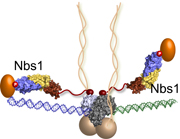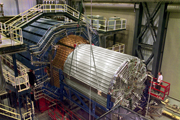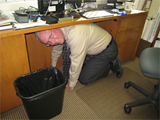


Scientists from Berkeley Lab and the Scripps Research Institute have uncovered the role played by the least-understood part of a first-responder molecule that rushes in to bind and repair breaks in DNA strands, a process that helps people avoid cancer. With this final piece of the puzzle in place, scientists can better understand how the repair mechanism fends off cancer in healthy people, and conversely, how it helps cancer cells resist chemotherapy. This could enable researchers to develop more effective therapies with fewer side effects. More>
 Dust off your sneakers and get ready for the 32nd Runaround on Friday, Oct. 9. Runners and walkers should meet outside the Firehouse at noon. Finishers will receive a custom Runaround t-shirt and refreshments. The informal Bikearound will start at the Firehouse at 11:30. Rumor has it the Lab’s Hula Hoop club will also be racing, but at the back of the pack.
Dust off your sneakers and get ready for the 32nd Runaround on Friday, Oct. 9. Runners and walkers should meet outside the Firehouse at noon. Finishers will receive a custom Runaround t-shirt and refreshments. The informal Bikearound will start at the Firehouse at 11:30. Rumor has it the Lab’s Hula Hoop club will also be racing, but at the back of the pack.
 STAR, the Solenoidal Tracker At RHIC (RHIC is Brookhaven National Laboratory’s Relativistic Heavy Ion Collider), serves 54 institutions from 12 countries and has a total of 575 collaborating scientists, engineers, students, and staff from universities and national labs. The STAR experiment, one of RHIC’s two major experiments, was conceived and designed at Berkeley Lab, and its central detector, the Time Projection Chamber, was built here. The Lab will play host to the STAR collaboration meeting beginning Monday through Saturday with a full agenda featuring speakers from three continents on the latest developments in 10 years of experiments. Hans Georg Ritter of the Nuclear Science Division is the local chair.
STAR, the Solenoidal Tracker At RHIC (RHIC is Brookhaven National Laboratory’s Relativistic Heavy Ion Collider), serves 54 institutions from 12 countries and has a total of 575 collaborating scientists, engineers, students, and staff from universities and national labs. The STAR experiment, one of RHIC’s two major experiments, was conceived and designed at Berkeley Lab, and its central detector, the Time Projection Chamber, was built here. The Lab will play host to the STAR collaboration meeting beginning Monday through Saturday with a full agenda featuring speakers from three continents on the latest developments in 10 years of experiments. Hans Georg Ritter of the Nuclear Science Division is the local chair.
 Nuclear theorist Wick Haxton, for 15 years the head of the Department of Energy’s Institute for Nuclear Theory at the University of Washington, has returned to his home state of California with joint appointments as a senior scientist in Berkeley Lab’s Nuclear Science Division and a professor of physics at the University of California. Among Haxton’s interests are neutrino astrophysics (he was an early champion of the Deep Underground Science and Engineering Laboratory, DUSEL), many-body physics, tests of the fundamental symmetries in atoms and nuclei, and employing powerful computers to contribute to these fields and others. More>
Nuclear theorist Wick Haxton, for 15 years the head of the Department of Energy’s Institute for Nuclear Theory at the University of Washington, has returned to his home state of California with joint appointments as a senior scientist in Berkeley Lab’s Nuclear Science Division and a professor of physics at the University of California. Among Haxton’s interests are neutrino astrophysics (he was an early champion of the Deep Underground Science and Engineering Laboratory, DUSEL), many-body physics, tests of the fundamental symmetries in atoms and nuclei, and employing powerful computers to contribute to these fields and others. More>
 Health and Wellness: Test Your Flu IQ
Health and Wellness: Test Your Flu IQ Feeling sick, but not sure if you have the flu? The Tang Health Center on the UC Berkeley campus has developed a handy web tool to help determine whether you have contracted influenza or just a common cold. With flu season in full swing and the H1N1 declared a pandemic, it's important to remember to stay home if you are sick to prevent the spread of the virus to others. For more information about the H1N1 pandemic, visit the Lab's Pandemic website.
 On Thursday, Oct. 15, the "Great California ShakeOut" will take place across the state, and Berkeley Lab will be participating. A Drop, Cover, Hold and Evacuation drill will take place at 10:15 a.m., similar to those conducted during the Lab’s Emergency Preparedness Week last spring. Instruction will be provided via a public address announcement. The drill should last no more than 20 minutes. All ALS and Molecular Foundry User Conference attendees at the time of the drill will be exempt from participation. After the drill, the exercise will be evaluated using an online survey. Go here for more information, or contact Rocky Saunders (x7032).
On Thursday, Oct. 15, the "Great California ShakeOut" will take place across the state, and Berkeley Lab will be participating. A Drop, Cover, Hold and Evacuation drill will take place at 10:15 a.m., similar to those conducted during the Lab’s Emergency Preparedness Week last spring. Instruction will be provided via a public address announcement. The drill should last no more than 20 minutes. All ALS and Molecular Foundry User Conference attendees at the time of the drill will be exempt from participation. After the drill, the exercise will be evaluated using an online survey. Go here for more information, or contact Rocky Saunders (x7032).
From June 24 through July 24, the Lab had proposed a policy revision to RPM §2.26 (Catastrophic Leave Sharing). The policy revisions proposed at that time included the following changes: (1) redefining the meaning of catastrophic illness or injury, and (2) adding catastrophic casualty loss and catastrophic bereavement loss as additional components for requesting leave donations. In addition, the Lab proposes to change the name of the policy from "Catastrophic Leave Sharing" to "Leave Sharing," and to make the program available to those employees in "good standing." Go here to read the proposed policy. This policy applies to non-represented employees only. Represented employees should contact their union representative or consult their collective bargaining agreement. To comment on this proposed change, contact [email protected] by Oct. 23.
Today at Berkeley Lab is produced by Public Affairs' Communications Group